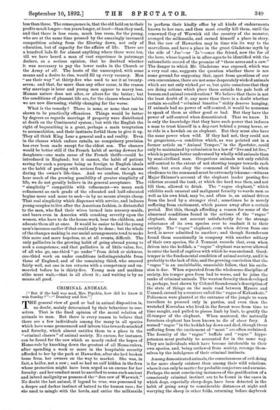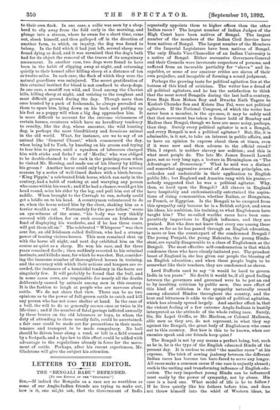CRIMINAL ANIMALS.
[" But if the bull was mad, Mrs. Pipchin, how did he know it was Sunday P "—" Dombey and Son.") THE general view of good or bad in animal disposition is, no doubt, mainly determined by their behaviour to our- selves. That is the fixed opinion of the moral relation of -animals to man. But there is every reason to believe that there are a few individuals among the many in all species which have some pronounced and inborn bias towards mischief and ferocity, which almost entitles them to a place in the "criminal classes" of animal society. No excuse, for instance, can be found for the cow which so nearly ended the hopes of Home-rule by knocking down the greatest of all Home-rulers, after spending a week or more in the hospitable security afforded to her by the park at Hawarden, after she ha d broken loose from her owners on the way to market. She was, in fact, a heifer, not a cow ; and so had no calf hidden in the fern whose protection might have been urged as an excuse for her ferocity: and her conduct must be ascribed to some such ancient and inbred malignity as possessed the " dun cow of Warwick." No doubt the last animal, if legend be true, was possessed by a deeper and darker instinct of hatred to the human race; for she used to mingle with the herds, and entice the milkmaids to perform their kindly office by all kinds of endearments known to her race, and then most cruelly kill them, until the renowned Guy of Warwick rid the country of the monster, avenged the milkmaids, and earned himself a place in story. But the cow of Hawarden may in time win its way to the marvellous, and have a place in the great Gladstone myth by the side of ' Joe'—or Io '—once the friend, now the foe of the hero, whose legend is in after-ages to be identified with the rationalistic record of the promise of " three acres and a cow." The danger to which Mr. Gladstone was exposed, which was a very real one, suggests the question whether there is not some ground for supposing that, apart from questions of our own convenience, there are not some desperately wicked animals which are not only wicked per se, but quite conscious that they are doing actions which place them outside the pale both of human and animal consideration ? We believe that there is not the least doubt of it, any more than there is a doubt whether certain so-called " criminal lunatics " richly deserve hanging. If animals bad no power of self-control, it would be nonsense to speak of them as either good or bad. But they have the power of self-control when domesticated. That we know. It is only the knowledge that they have such power that induces a man to trust himself in a dog-cart behind a young horse, or to ride in a howdah on an elephant. But they must also have the same power when wild. If they had not, they could not be gregarious,—a condition which, as was pointed out in a former article on " Animal Temper," in the Spectator, could only be maintained by submission to a law of " live and let live," which is perhaps better understood by wholly wild animals than by semi-civilised man. Gregarious animals not only exhibit self-control to the extent of not showing temper towards each other, but even obey the command of their leader, when obedience to the command must be extremely irksome—witness Major Skinner's account of the elephant leader posting five videttes around the tank, at which the herd was then, and not till then, allowed to drink. The " rogue elephant," which exhibits such unusual and malignant ferocity to wards men as well as his own kind, may be, and often is, an animal driven from the herd by a stronger rival ; sometimes he is merely suffering from excitement, which passes away after a certain period. But this, though affording a reason for some of the abnormal conditions found in the actions of the " rogue " elephant, does not account satisfactorily for the strange reluctance of its own species ever to readmit it to their society. The " rogue " elephant, even when driven from one herd, is never admitted to another; and though Saanderson found them occasionally in company with another solitary of their own species, Sir J. Tennant records that, even when driven into the keddah, a " rogue " elephant was never allowed to enter the herd of captives with which he was enclosed. Good- temper is the fundamental condition of animal society, and it is probably to the lack of this, and the growing conviction that the " rogue " is an unclubbable, unsociable fellow, that his exclu- sion is due. When separated from the wholesome discipline of society, hie temper goes from bad to worse, and he joins the ranks of criminal animals. The wanton ferocity then developed is, perhaps, best shown by Colonel Saunderson's description of the state of things on the main road between Mysore and Uznand, caused by a creature called the " rogue of Kakankote." Policemen were planted at the entrance of the jangle to warn travellers to proceed only in parties, and even then the wretched Kurrabas who lived in the forest were from time to time caught, and pulled to pieces limb by limb, to gratify the ill-temper of the elephant. When mastered, the naturally ferocious elephant has been known to die of sheer fury. A
noosed " rogue " in the keddah lay down and died, though those suffering from the excitement of " muet " are often reclaimed.
The ferocity of the " rogue " buffalo and " rogue " hippo- potamus must probably be accounted for in the same way. They are individuals which have become intolerable to their own species, and, being outlawed from society, revenge them- selves by the indulgence of their criminal instincts.
Among domesticated animals, the consciousness of evil-doing is far more clearly existent than among their wild relations, where it can only be matter for probable conjecture and surmise. Perhaps the most convincing instances of the gratification of a consciously criminal instinct are to be found in the cases in which dogs, especially sheep-dogs, have been detected in the habit of going away to considerable distances at night and worrying the sheep in other folds, returning before daybreak to their own flock. In one case, a collie was seen by a shep- herd to slip away from the fold early in the morning, and plunge into a stream, where he swam for a short time, came out, shook himself, and then galloped off in the direction of another farm, to which, on inquiry, the dog was found to belong. In the fold which it had just left, several sheep were found dying or dead, and it was surmised that the dog's bath had for its object the removal of the traces of its sanguinary amusement. In another case, two dogs were found to have been in the habit of slipping away at night, and returning quietly to their kennel after killing sheep at a distance of ten or twelve miles. In each case, the flock of which they were the natural guardians was uninjured. The secret gratification of this criminal instinct for blood is not confined to sheep-dogs. In one case, a mastiff ran wild, and lived among the Cheviot hills, killing sheep at night, and retiring to the roughest and most difficult ground during the day. Though more than once hunted by a pack of foxhounds, he always prevailed on them to spare him, lying down on his back, and putting up his feet as a puppy will when a big dog approaches him. It is more difficult to account for the extreme viciousness of certain horses, creatures which have no hereditary tendency to cruelty, like the dog, whose ancestor, the wild hunting dog, is perhaps the most bloodthirsty and ferocious animal in the old world. What, for instance, are we to say of an animal like General Chasse,' which commenced the day, when being led to York, by kneeling on his groom and trying to tear him to pieces, until a squadron of labourers charged him with sticks and forks P or of Merlin,' who was obliged to be double-chained to the rack in the painting-room when he visited Mr. Herring, and made use of his liberty by killing his groom ? Another horse could only be groomed for several seasons by a series of well-timed dashes with a birch-broom. King Pippin,' a celebrated Irish horse, which ran early in the century, had a habit of rushing at and worrying any person who came within his reach; and if he had a chance, would get his head round, seize his rider by the leg, and pull him out of the saddle. When brought to the Curragh to run, nobody could get a bridle on to his head. A countryman volunteered to do so, when the horse seized him by the chest, shaking him as a terrier would a rat. " Fortunately for the poor fellow," wrote an eye-witness of the scene, "his body was very thickly covered with clothes, for on such occasions an Irishman is fond of displaying his wardrobe, and if he has three coats, will put them all on." The celebrated " Whisperer" was then sent for, an old Irishman called Sullivan, who had a strange power of taming vicious horses. This man remained shut up with the horse all night, and next day exhibited him on the course as quiet as a sheep. He won his race, and for three years remained docile ; then suddenly reverted to his criminal instincts, and killed a man, for which he was shot. But, consider- ing the immense number of thoroughbred horses in training, and the accuracy with which their actions and tempers are re- corded, the instances of a homicidal tendency in the horse are singularly few. It will probably be found that the bull, and in some cases cows, are responsible for nearly all the deaths deliberately caused by animals among men in this country. It is the fashion to laugh at people who are nervous about cattle. We do not share that view. There can be no two opinions as to the power of full-grown cattle to catch and kill any person who has not some shelter at hand. In the case of a bull, the will to do so generally occurs once or twice in its life-time ; and if the number of fatal gorings inflicted annually by these brutes on the old labourers or boys, to whom the duty of attending to them usually falls, could be ascertained, a fair case could be made out for precautions in their main- tenance and transport to be made compulsory. No bull should be driven loose along a road, or left in a field crossed by a footpath, and a bye-law to this effect could be added with advantage to the regulations already in force for the move- ment of cattle. Perhaps, after his recent experiences, Mr. Gladstone will give the subject his attention.



































 Previous page
Previous page